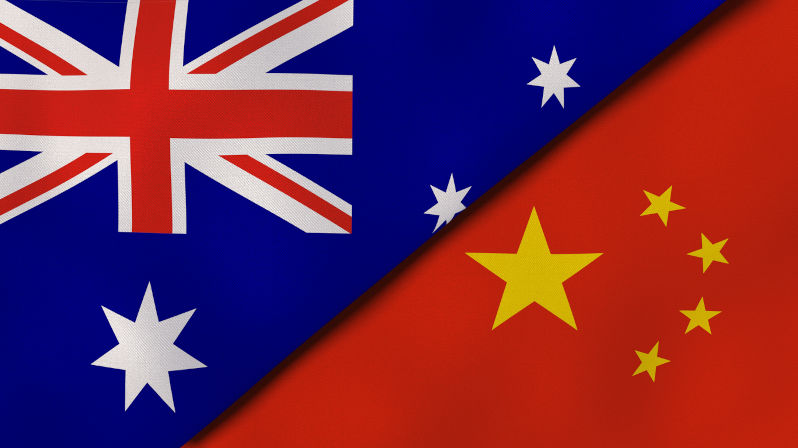Bewilderingly unsophisticated: ASPI deputy director fires up China threat megaphone
February 20, 2024
Alex Bristows recent piece on China (Dont sidestep the China problem in public debate on defence, Australian Financial Review, 14 February) demonstrates the extent to which the Australian Strategic Policy Institute has become a cheerleader for the US military-industrial complex.
In a piece published by the Australian Financial Review on 14 February and reproduced on the ASPI website, Dr Alex Bristow, Deputy Director of ASPI, proposed that serving Defence personnel should speak out in public about the threat posed to the Australian community by Chinas assertive behaviour.
Bristows justification for his proposal is that the public needs to become more aware of the nature of the threat posed by Xi Jinpings China. He says Australia does not seek an adversarial relationship with China, but Xi must learn to accept that democracies, unlike the Chinese Communist Party, have a duty to tell their public the truth.
Under the Westminster system it is considered inappropriate for senior public servants including military officers to speak out on matters relating to sensitive public policy. That is a role for Ministers. The Albanese governments support both for AUKUS and for a new strategic posture based on denial at a distance show they are well aware of the tensions in the relationship and the need to boost our defence capability in response to Chinas massive increase in military expenditure. In contrast to the previous government, however, the enhancement of hard power has been complemented by energetic diplomacy aimed both at stabilising the relationship with Beijing and increasing Australias visibility in neighbouring Pacific nations being courted by China.
Yet for Dr Bristow, a former British diplomat who once served in Beijing focussing on human rights, to suggest that Australian military personnel should speak out to warn Australians about China and to enlighten President Xi on the characteristics of democratic governments, is bizarre. Bristow appears to want to take us back to that unhappy period when the Morrison government fired up the megaphone and called Game on to China. Ministers seemed to take pleasure in provoking Beijing, not only with Australia taking the lead in sponsoring an inquiry into the origins of COVID-19 but even in speculating out loud about going to war alongside the Americans.
If there were any benefits to Australia in poking the Panda, they were not immediately apparent. Chinas response was to introduce damaging trade sanctions against our exports and put the political relationship in the cooler. Admittedly the Americans seemed to admire Australias plucky stance and told us they had our back but, if so, the benefits werent obvious. Indeed, the main beneficiaries of Australias bold stand were American barley farmers, who cheerfully took over our former markets. There is no obvious Australian national interest in provoking China unless you believe it is necessary to shore up the American alliance. This is the only plausible reason for the Morrison government to take the actions it did and for groups like the intelligence and defence establishment, ASPI and the Murdoch press to adopt a consistently hawkish stance on China.
This approach is not only ill-advised in national interest terms, however, but is also based on a false premise.
First, it assumes that Australias interests in terms of the relationship with China are congruent with those of the United States. You only need to look at a map to understand they probably are not. Australia is far more reliant than the US on China for its economic wellbeing and wealth. In addition, while an unsuccessful war with China would be painful in the extreme for America, it may well be catastrophic for Australia. The US could retreat east of Hawaii and remain a world power. Australia would be left to rebuild its economy as best it could while struggling to preserve its sovereign independence in a region dominated by a vengeful and authoritarian hegemon.
The second reason we dont need constantly to pander to our ally is that Australia consistently underestimates the benefits that the US derives from the alliance. Even 50 years ago, when Chinas power was only a fraction of what it is today, a top-secret analysis of the US-Australia relationship commissioned in the last weeks of the Nixon administration, while it remains heavily redacted, suggests that the Americans enjoyed at least as much benefit from the alliance as Australia. Much of that benefit was derived from the US intelligence gathering facility at Pine Gap near Alice Springs, the details of which also remain redacted from that report half a century later. Pine Gap would still play a vital role in any conflict in which the US was engaged, including a nuclear war.
It was refreshing to see that James Curran, in a piece in the Australian Financial Review also on 14 February, challenged the view from national security hawks that the government would need to bend over backwards to persuade a new Trump administration to retain ANZUS. Such advice too easily forgets the very real gifts that successive Australian governments, including this one, have willingly offered America in the past and present: an intelligence facility in Alice Springs critical to the defence of the US homeland, along with permanent rotations bases, effectively for US troops and naval deployments. Those facilities are for warfighting with China.
Looking at Americas alliance structure more broadly, Curran went on to say that far from it being a one-way street where Washington alone hands out all the strategic bells and whistles, South Korea, Japan and Australia are essential to American security.
This simple truth raises another very important issue. Because of Pine Gap, Australia would be a nuclear target in any major power conflict that escalated beyond a conventional exchange. Yet Australia is the only country of the three mentioned here whose alliance with the United States does not include a military guarantee of its security, including extended nuclear deterrence. If Australia suffered an attack by any power even a nuclear attack on an American facility the US is not bound by ANZUS to come to our assistance with a military response.
In a wider sense, all the 31 member countries of NATO including many without the benefits of 100 years of mateship, such as Albania, Hungary and North Macedonia enjoy an American military guarantee of their security. Australia does not.
This implies a significant failure in Australias policy towards the United States over the last half century. Successive Australian governments, supported by much of the media and organisations such as ASPI, have committed our forces to fight alongside the US in wars that were not necessarily in our national interest such as in Vietnam and Iraq because of an ongoing desire to demonstrate to America the value of the ANZUS alliance. Yet the regular payment of what was regarded as an insurance premium for the alliance was unnecessary because (a) the US derives greater benefits from the relationship than Australia does; and (b) au fond, ANZUS is a threadbare alliance, with no substantial binding commitments on either side.
In addressing a significant and ongoing challenge from China, the Albanese government is to be commended for moving Australian foreign and defence policies towards the Teddy Roosevelt model of speaking softly and carrying a big stick. In delivering this strategy, however, the government needs not only to provide substantially greater funding but also to ensure the portfolio Ministers are capable of driving both their department and defence industry to deliver outcomes similar to those achieved by Kim Beazley late last century. The evidence suggests that presently they are not.
A strengthened ANZUS would also be of vital importance for Australias security. After more than 70 years, it is time for a review. In seeking the same kind of security guarantee that other US allies enjoy, Australia needs to understand it has a very strong negotiating card to play in the future of Pine Gap.
For more on this topic, P&I recommends:

